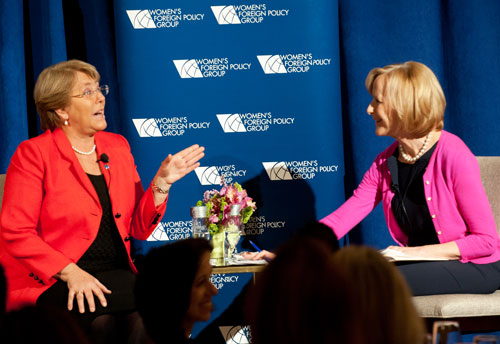|
April 20, 2012 | Washington, DC | Celebrating Women Leaders Luncheon
Women's Empowerment in the Middle East and Worldwide Michelle Bachelet, Executive Director, UN Women Diplomatic Honorary Committee | Photos | Podcast | Sponsors | Transcript
 On April 20, 2012, Women's Foreign Policy Group honored Michelle Bachelet, the first Executive Director of UN Women and former President of Chile, for advancing women's economic empowerment and political participation. Following her remarks on "Women's Empowerment in the Middle East and Worldwide," she discussed the status of UN Women one year after its creation and the remaining challenges that women face, particularly in the Middle East. The conversation was moderated by Judy Woodruff, Co-Anchor and Senior Correspondent for PBS NewsHour. On April 20, 2012, Women's Foreign Policy Group honored Michelle Bachelet, the first Executive Director of UN Women and former President of Chile, for advancing women's economic empowerment and political participation. Following her remarks on "Women's Empowerment in the Middle East and Worldwide," she discussed the status of UN Women one year after its creation and the remaining challenges that women face, particularly in the Middle East. The conversation was moderated by Judy Woodruff, Co-Anchor and Senior Correspondent for PBS NewsHour.In terms of progress made by UN Women in its first year, Bachelet explained that, while successful, "we are just walking and we need to start running." She feels there is still much work to be done on women's political participation and explained why it is so crucial to have more women in political decision-making positions. "When women participate in politics and the economy, it [not only] reinforces women's civil, political, and economic rights, [it also] strengthens democracy, the economy, and sustainability" and creates a healthier society, which advances issues such as housing, water, sanitation, and health. Out of 194 United Nations Member States, for example, only 18 have women heads of state or heads of government, statistics she says are "not to celebrate." However, she underlined the important achievements of women in the Nordic states, where women ministers account for 48% of all ministerial positions, and the Beijing Platform for Action goal, under which four new countries since 2010 now have more than 30% female representation in parliament. She also highlighted the importance of special transitional measures, such as quotas, in facilitating women's involvement in politics. Bachelet addressed the specific challenges facing women in the Arab World, where they have been at the forefront of many of the uprisings but still are struggling to achieve equal participation. In her opinion, it is crucial that women's economic, social, civic, and political rights become enshrined in the new constitutions in Tunisia, Libya, and Egypt. She cited encouraging developments in two countries: Tunisia, where new laws to secure parity on candidate lists allowed 26% women to be elected, and Morocco, where the introduction of quotas for women parliamentarians resulted in a 6 point increase in women legislators last year. However, despite advancements, Bachelet pointed out that women still only represent 10.7% of parliamentarians throughout the Middle East and the region remains "the only one in the world without any parliament that includes at least 30% women." To Bachelet, Egypt perhaps represents the most dramatic setback—in January, the country witnessed a drop from 12% to 2% of women in parliament. On the subject of Afghanistan, she had better news since Afghan women have made important gains over the past decade—ranging from a constitution that protects gender equality, to quotas which ensure women's political participation, to the implementation of the country’s first law on ending violence against women. Bachelet was happy to see that 2.4 million of the over 7 million children currently in primary or secondary school are now girls. While these may be signs of hope for a more stable, just, and democratic country, the main challenge now is to ensure the progress in women’s rights not be reversed, particularly in terms of violence against women. Going forward, Bachelet said that women will strive to have their voices heard in upcoming summits around the world, including the NATO Summit meeting and the Tokyo conference on Afghanistan in July. She expressed hope for the future, stating that "all over the world, women have shown time and again that no matter the difficulties, no matter the obstacles, no matter that we have to be twice as good, women rise to the occasion." The conversation ended with the question on everyone's mind, whether Michelle Bachelet is considering another run for President of Chile. In response, Bachelet reiterated her strong commitment to UN Women and how much she loved what she was doing; however, she did not rule out another run for the presidency. |

